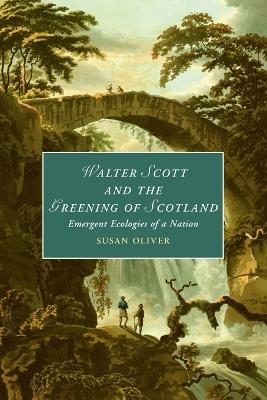
Walter Scott and the Greening of Scotland
Emergent Ecologies of a Nation
Seiten
2023
Cambridge University Press (Verlag)
978-1-108-92688-1 (ISBN)
Cambridge University Press (Verlag)
978-1-108-92688-1 (ISBN)
For academics, students and general readers interested in how literature intersects with environmental history, a focus on Walter Scott and nineteenth-century writing puts this study in the context of the emerging Anthropocene. Scotland's human and nonhuman land relations along with ecocritical theory provide national and global perspectives.
The work of Walter Scott, one of the most globally influential authors of the nineteenth century, provides us with a unique narrative of the changing ecologies of Scotland over several centuries and writes this narrative into the history of environmental literature. Farmed environments, mountains, moors and forests along with rivers, shorelines, islands and oceans are explored, situating Scott's writing about shared human and nonhuman environments in the context of the emerging Anthropocene. Susan Oliver attends to changes and losses acting in counterpoint to the narratives of 'improvement' that underpin modernization in land management. She investigates the imaginative ecologies of folklore and local culture. Each chapter establishes a dialogue between ecocritical theory and Scott as storyteller of social history. This is a book that shows how Scott challenged conventional assumptions about the permanency of stone and the evanescence of air; it begins with the land and ends by looking at the stars.
The work of Walter Scott, one of the most globally influential authors of the nineteenth century, provides us with a unique narrative of the changing ecologies of Scotland over several centuries and writes this narrative into the history of environmental literature. Farmed environments, mountains, moors and forests along with rivers, shorelines, islands and oceans are explored, situating Scott's writing about shared human and nonhuman environments in the context of the emerging Anthropocene. Susan Oliver attends to changes and losses acting in counterpoint to the narratives of 'improvement' that underpin modernization in land management. She investigates the imaginative ecologies of folklore and local culture. Each chapter establishes a dialogue between ecocritical theory and Scott as storyteller of social history. This is a book that shows how Scott challenged conventional assumptions about the permanency of stone and the evanescence of air; it begins with the land and ends by looking at the stars.
Susan Oliver is Deputy Dean (Research) at the Faculty of Arts and Humanities, University of Essex. She is the winner of the British Academy's Rose Mary Crawshay prize for Scott, Byron and the Poetics of Cultural Encounter (2006), and is also the editor of The Yearbook of English Studies: New Approaches to Walter Scott (2017).
1. Introduction: Walter Scott and the Environment; 2. Shifting Ecologies: Grasslands, Rivers and Shorelines; 3. Toxic Ecologies, Ecogothic, and Violence Against the Land; 4. Wild Places, Rarity and Extinction; 5. Trees; 6. Stone, Water, Air.
| Erscheinungsdatum | 12.12.2023 |
|---|---|
| Reihe/Serie | Cambridge Studies in Romanticism |
| Zusatzinfo | Worked examples or Exercises |
| Verlagsort | Cambridge |
| Sprache | englisch |
| Themenwelt | Geisteswissenschaften ► Sprach- / Literaturwissenschaft ► Anglistik / Amerikanistik |
| Geisteswissenschaften ► Sprach- / Literaturwissenschaft ► Literaturgeschichte | |
| Naturwissenschaften ► Biologie ► Ökologie / Naturschutz | |
| ISBN-10 | 1-108-92688-6 / 1108926886 |
| ISBN-13 | 978-1-108-92688-1 / 9781108926881 |
| Zustand | Neuware |
| Haben Sie eine Frage zum Produkt? |
Mehr entdecken
aus dem Bereich
aus dem Bereich
Poetik eines sozialen Urteils
Buch | Hardcover (2023)
De Gruyter (Verlag)
59,95 €
Buch | Softcover (2024)
belleville (Verlag)
20,00 €


